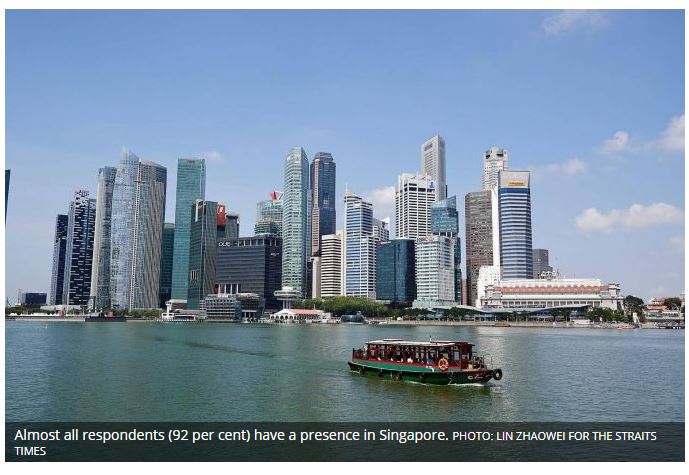Strong prospects in Asean, but firms face hurdles to regional expansion: survey
COMPANIES are keen to tap the growth prospects in Asean, but find it tough to overcome regulatory barriers, identify suitable business partners and hire the right talent to support growth, a new survey has found.
Four in five respondents to the poll, conducted by The Business Times and Standard Chartered Bank, said their companies have plans to expand in Asean over the next three to five years.
But even as they acknowledged the region’s strong prospects, the survey respondents spoke of the significant hurdles to growth and said that more can be done to improve linkages among the Asean economies.
The Business Times-Standard Chartered Leaders’ Survey 2018 polled 129 leaders and business owners across industries. The online survey was carried out between March 19 and April 22.
Most of the respondents were from small and medium-sized companies; 43 per cent said they logged annual revenue below S$10 million; 17 per cent recorded sales of between S$10 million and S$50 million, and 7 per cent had revenue ranging from S$50 million to S$99 million.
Among respondents from larger firms, 16 per cent were from companies with turnover exceeding S$1 billion; 7 per cent said their annual sales came in at between S$500 million and S$999 million, and 9 per cent, between S$100 million and S$499 million.
Almost all respondents (92 per cent) have a presence in Singapore. The next most popular market was Malaysia, where 54 per cent of respondents have a presence. This was followed by Indonesia, Thailand, Vietnam and the Philippines.
Edward Lee, chief economist for Asean and South Asia at Standard Chartered Bank and presenter of the survey findings at The Business Times Leaders’ Forum 2018 on Monday, said: “The business proposition offered by Asean is clear.
“Interestingly, only around 50 per cent of respondents have some presence in Asean outside of Singapore. There is clearly scope for expansion into the region.”
Among those keen to expand in Asean, 34 per cent ranked Indonesia as their top priority over the next 12 months. Other popular destinations were Malaysia, Thailand, Vietnam and the Philippines; some respondents said they were eyeing emerging markets like Myanmar and Cambodia.
Growing domestic demand and customer requests were the most commonly cited reasons for expanding in these markets.
“Tapping into the region’s growing wealth appears to be a primary motivation for our respondents’ investments into the region,” said Mr Lee.
“This is interesting when placed against the context of global exporters from North-east Asia that tend to focus on operational considerations.”
Among the 20 per cent who said their companies are not planning to expand in Asean over the next three to five years, the top two reasons cited were the lure of other markets and manpower constraints.
The poll also revealed that companies doing business in Asean face a number of challenges; the top two were dealing with local rules and regulations, and finding suitable business partners.
Respondents said the region is not integrated enough – despite efforts to create an economic community – and that more can be done to encourage collaboration at the government level as well as among businesses.
One respondent said; “There are great opportunities in Asean but governments can do more to enable companies to work across the region more seamlessly.”
Another said: “Asean has huge potential, but we are unable to progress due to lack of coordination on aspiration and vision for improvement. As everyone is for themselves, the connectivity is limited and our potential restricted. More can be done.”
Yet another noted: “Infrastructure and connectivity is a both an enabler and a bottleneck for many of the countries in this region.”
Judy Hsu, the chief executive officer for Singapore and Asean markets at Standard Chartered Bank, said: “Based on our history and experience of supporting clients in all 10 Asean markets, we understand the importance of first, providing them with in-depth market insights and helping them to understand local regulations and business practices, and second, giving them access to our extensive international network to support them wherever they want to go.”
Source: https://www.businesstimes.com.sg/government-economy/strong-prospects-in-asean-but-firms-face-hurdles-to-regional-expansion-survey


 Thailand
Thailand




